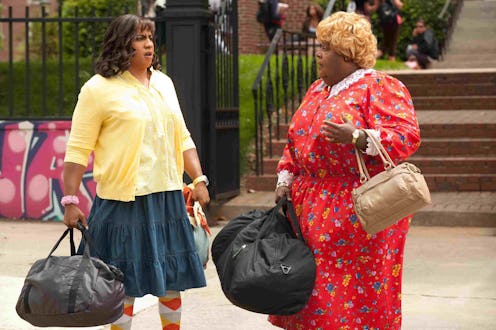Entertainment
Why Black Male Actors Portraying Plus Size Women In Movies Is So Dangerous

With Tyler Perry's Boo 2! A Madea Halloween in theaters, a movie in which the male filmmaker and actor plays the female lead Madea, it's clearer than ever that Hollywood doesn't understand what it means to be a plus size Black woman. For decades, these women have been scarcely represented in film and television, with the roles that have existed typically offensive and stereotypical. And the frequent occurrence of Black men playing full-figured Black women, like in Boo 2!, has made matters worse. From Perry in the Madea films to Big Shirley in Martin to Eddie Murphy in Norbit and Nutty Professor and Brandon T. Jackson with Martin Lawrence in Big Mommas, plenty of famous Black men have portrayed cliched, frustrating versions of plus size Black woman that show the characters as grotesque, uncivilized, easily angered and incredibly "manly" in strength.
Seeing Black men play plus size female characters is extremely detrimental to the depiction of real fat Black women on-screen and the progress of real female actors who fit that bill in Hollywood. Full-figured Black women rarely get positive representation on-screen; usually, they only are chosen to play the comedic relief, often hyper-sexualized, like Nikki Parker (Mo'Nique) on The Parkers. Or, they're portrayed as "unfeminine" and aggressive, like Coretta Cox (The Lady of Rage) on The Steve Harvey Show. Sometimes, these characters are seen as nurturing but asexual and undesirable, like Queen Latifah’s Leslie Wright in Just Wright. And, frequently, Plus-size Black actors are constrained to roles that make their bodies the focal point of ridicule and humiliation. We've seen this happen in movies like Precious, Just Wright, Why Did I Get Married, Phat Girlz, and so, so many more.
In a 2012 interview with Essence, actor Amber Riley explained just how difficult it is to be a plus size Black woman in the film/TV industry. “Hollywood is a very hard place to be in. It really is. Being the person I am you know, the size I am, being a woman, being a Black woman, there’s not a lot of roles for us,” said Riley. The actor added that she's turned down roles that didn’t fit who she was — including anything that contained negative images of plus size women.
Meanwhile, author Roxane Gay, who wrote the bestselling memoir Hunger: A Memoir of (My) Body, said in an article for the Wall Street Journal that for plus size female actors, the fight for equality comes with a cost. "Overweight actresses are routinely constrained to roles and plots that make their body a focal point and, more often than not, a source of ridicule or humiliation," said Gay. "They are always considered overweight long before they are considered women. The constancy of this erasure is telling."
When bigger Black women are forced to only play undesirable nurturers, hyper-sexual bullies, or forms of comedic relief, it makes it seem like they're not capable of being anything else. As such, having men play them for comedic relief makes things even worse, as it adds to the masculine stereotype behind so many of these characters. Just take Perry's Madea; an older, plus-size woman, she refuses to put up with nonsense from anyone and keeps a pistol in her bag. Although Madea can be a source of wisdom at times, she's still viewed as loud, violent, and hyper-masculine, reminiscent of a mammy archetype.
In the animated show Martin, the voice of Big Shirley, the domineering girlfriend of Martin’s best friend Cole (Carl Anthony Payne), was reportedly played by a man, and the character's body was exaggeratedly large. In the rare scenes that featured Big Shirley, her body towered over supporting characters and did not fit on screen. Eddie Murphy played a similar character, Rasputia, in Norbit, who was a physically abusive and mean plus-size woman who forced her husband to have sex with her. These characters degrade the real plus-size Black women of the world, and contribute to the offensive stereotypes that persist in our culture.
There need to be many more relatable, realistic depictions of fat Black women in Hollywood, played by women, not men dressed up and exaggerating cliched characteristics for laughs. Complex characters like Gabourey Sidibe’s Becky on Empire, who's funny, talented, and sexual, and Queen Latifah's Francine in Brown Sugar, who's quick-witted and sultry, are great, but they're not enough. The lack of thoughtful stories featuring plus-size Black women is an oversight in film and television, and it reinforces the unfair and harmful idea that plus size Black women don't deserve to have their lives depicted accurately.